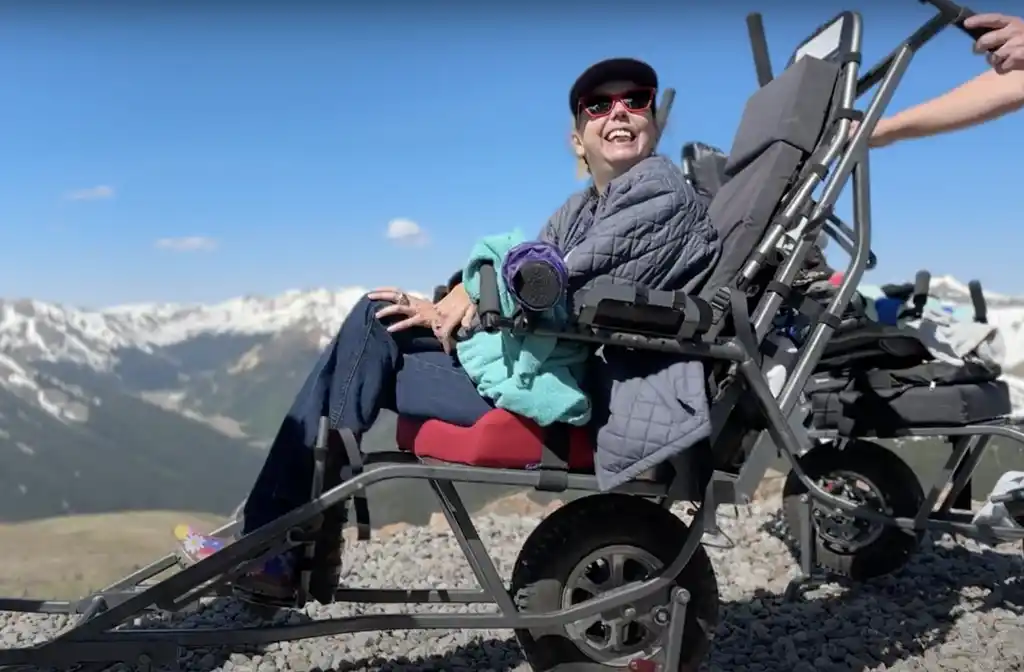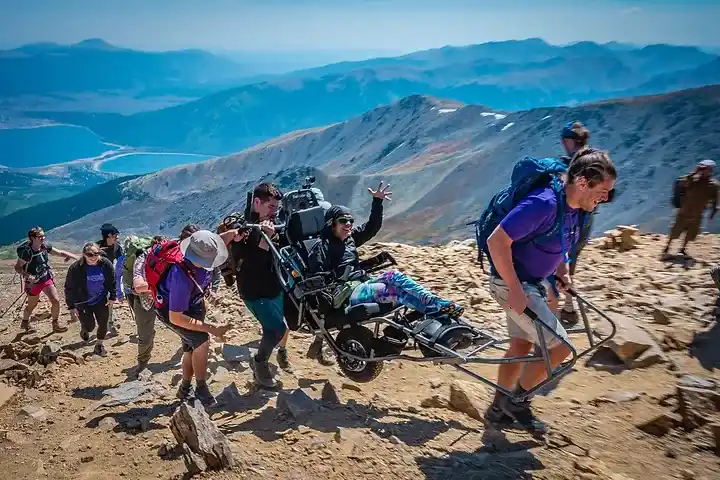
Contrary to popular belief, there are a few benefits to being a wheelchair user. Adaptive recreation is one of them.
I’ve always been adventurous. Growing up, I practically lived at the creek in my neighborhood. I would create little homes for myself along the bank.
When I became a wheelchair user, I thought my life was over. Try to imagine how you would feel if you suddenly couldn’t walk, and overnight you became dependent on others. In talking to a good friend, we agreed that grieving the loss of your old self is vital to recovery. I think it’s the only way to learn that you’re still you; you’re just a different version of yourself.
For more than 30 years, groups of volunteers with Expand Beyond have provided speed boats, jet skis and adaptive equipment to help those with disabilities to sit-ski and wakeboard. Just this week, I watched an older blind gentleman waterski as I waited for my turn at the Boulder Reservoir.

After donning a life jacket and wetsuit, I was wheeled out onto a dock by the group volunteers. Two strong volunteers lowered me to a seated position on the board, and a metal cage secured me there. Outriggers lay parallel on either side of the rig, taking away the need for balance and steering. A ski rope was secured at the top tip of the main board, then volunteers lowered me backward into the water from the dock.
Once in the water, the starter volunteer straightened the line and positioned me behind the boat. When I was ready, the starter yelled, “Hit it!” to the driver.
As soon as I rose up out of the water, I had a smile on my face. I didn’t have to steer, which allowed me to completely enjoy the experience; hitting choppy water made me giggle out loud. I love speed and the feeling of rising to the surface. I like to stretch my arms out to the side like I’m flying. I also love to look at all the beautiful scenery that surrounds me.
Four volunteers followed me on two jet skis. If I had crashed, the rescue diver would have made sure my head stayed above water. The starter was there to reposition me in case I wanted to try again.
I get to do this every Tuesday morning this summer. My goal is to remove the outriggers and to use a handle on the rope to steer over the wake. This amazing activity is only made possible by the incredible generosity of volunteers who give not only their time and expertise but also all the equipment and gas for the speed boats and jet skis.
Another amazing adaptive recreational activity is hiking provided by The Lockwood Foundation. Founder Jeffrey Lockwood researched and found the TrailRider chair.
The TrailRider is similar to a wheelbarrow, with one wheel in the back and handles in the front. A group of volunteers carry the chair and adaptive rider while hiking up a mountain. Typically, one person carries the back of the chair, another carries the front and two to three volunteers carry the sides. Throughout the hike, the volunteers switch out positions to conserve strength and energy.
When I’m on the trailrider, I feel like Cleopatra reclining on a palanquin while being carried along.
Adaptive riders will first do a trial hike. This allows the adaptive rider and volunteer team to learn if the chair can be ridden safely and comfortably. After completing a trial hike, the adaptive rider can sign up to participate in long hikes. The Lockwood Foundation does not charge hikers for anything, an amazing fact considering that one TrailRider chair can cost up to $10,000.
On Father’s Day, The Lockwood Foundation took me on a hike to summit Mines Peak at Berthoud Pass, an elevation of 12,400 feet above sea level. It felt like the opportunity was created by my dad in heaven. We loved driving to the mountains to ski together.
Two other adaptive hikers joined my adventure, including a young girl with a terminal illness and a wheelchair user from New York who traveled with a team from all over the country to Colorado. Mines Peak was training for his ultimate goal to summit Mt. Kilimanjaro in Africa.

The beauty of hiking with The Lockwood Foundation is that it is beneficial for everyone involved. The incredible bond created by people working together for a common goal makes lifelong memories to cherish. Three hiking teams and several dogs worked together to climb Mines Peak. Once we reached the summit, we celebrated with a group howl.
Organizations like The Lockwood Foundation and Expand Beyond only exist thanks to big-hearted volunteers. These remarkable humans donate their time and resources to help others. That is a beautiful reminder of the good in humanity.
Please visit thelockwoodfoundation.org and expandbeyondinc.com to donate your time or money to these worthy causes. You can see video of our Mines Peak hike at youtube.com/watch?v=d_dHCD2YFi0&t=2s.
I have learned that becoming disabled didn’t end my life. Our bodies will change and possibly fail, but our mental strength determines when life is over.
Jenn Ochs lives in Boulder and enjoys listening to music, podcasts and audiobooks while painting or drawing. She is a disability rights advocate and a graduate from Baylor University in Texas, which is where she realized that Boulder is the best place to live. Read more of
